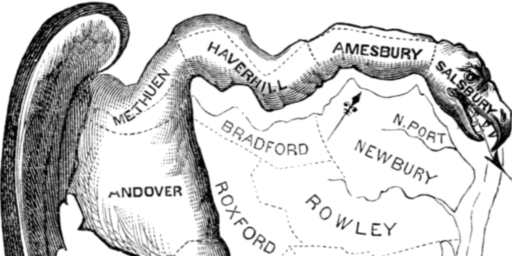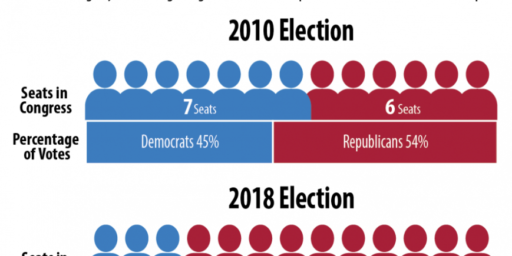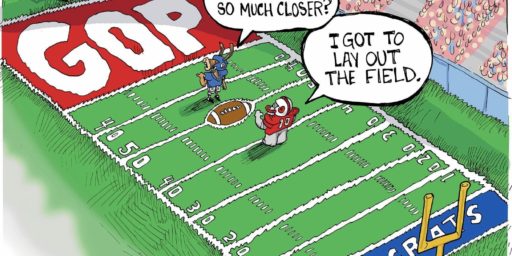GOP Gains In Statehouse Ahead Of Redistricting Battles
Just as important as Tuesday’s gains by the GOP in the House of Representatives and Senate are the gains that the party made at the state level just as the nation heads into the decennial Congressional reapportionment:
In numerous large battleground states, Republicans made substantial gains of governor offices and legislative chambers. That, in turn, will strengthen their hand in next year’s redistricting efforts, which will be launched officially next month when the Census Bureau’s 2010 state-by-state population count will produce the reapportionment of the House that will be elected in November 2012.
In Tuesday’s elections, Republicans gained at least 19 legislative chambers for a total of at least 55 in the 50 states. They will have bicameral control in a disproportionate share of the largest states, according to tentative post-election reviews by both parties.
The consequences for redistricting will be significant, not least because Republicans gained numerous House seats in those states that they will be better-positioned to safeguard two years from now. In most of the 10 states that are tentatively expected to lose House seats, the seat losses are more likely to come from Democrats.
“Between 15 and 25 [House] seats will be protected … or are more likely to be Republican after redistricting, after we have won these legislative chambers,” said Ed Gillespie, chairman of the Republican State Leadership Committee, which spent an estimated $30 million to influence those results.
(…)
A DLCC preliminary analysis showed that Republicans will control redistricting in states that have 194 House seats, compared with 124 for Democrats. At the start of the most recent redistricting process in 2001 — which also benefited the GOP — a similar review showed Republicans in control of states with 130 seats and Democrats with 101 seats.
Pennsylvania is typical of the states where redistricting inflicted additional wounds on Democrats. Republicans took over the state House, where Democrats had held a four-seat majority; the GOP retained its Senate control. And Republican Tom Corbett was elected governor of Pennsylvania, which likely will lose one House seat following reapportionment.
With the GOP’s five-seat gain flipping control of the state’s congressional delegation from 12-7 for Democrats to 12-7 for the GOP, the redistricting likely will target one of the remaining Democrats — perhaps Tim Holden or Mark Critz, who hold districts that are mostly outside metropolitan areas.
Republicans also control the Legislative and Executive Branches in both Florida and Texas, which are likely to gain as many as six House seats combined after the final redistricting numbers come out later this year. In others words, Republicans will have significant control over creating the Congressional districts that will exist for the next ten years, and that alone makes it more likely that the GOP could hold on to the House of Representatives for some time to come notwithstanding what seem to be the constantly shifting whims of the electorate.







Florida is going to be an interesting case, because we also passed an amendment to our state constitution adding additional restrictions on redistricting choices.
http://www.collinscenter.org/page/1gFLAmAmend5and6_MS
I expect there to be a large number of lawsuits, regardless of how the lines are drawn. In fact, we already have 2 congressman suing to have the amendment itself thrown out.
I’d be curious to see how they end up trying to gerrymander districts to favor the GOP in the House. They already tried to create as Republican-favorable a political landscape as possible after the 2000 Census, so I wonder where they’ll try now.
@Brett: A better job this time. Four Democrats won election to the US House or Representatives in Florida on Tuesday. I’m sure we can reduce that.